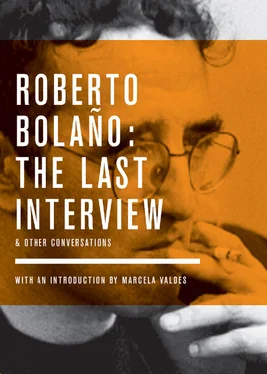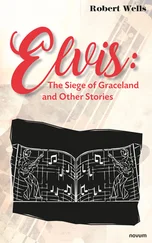A prolific writer, a literary animal who makes no concessions, Bolaño successfully combines the two basic instincts of a novelist: He is attracted to historical events, and he desires to correct them, to point out the errors. From Mexico he acquired a mythical paradise, from Chile the inferno of the real, and from Blanes, the town in northeast Spain where he now lives and works, he purges the sins of both. No other novelist has been able to convey the complexity of the megalopolis Mexico City has become, and no one has revisited the horrors of the coup d’état in Chile and the Dirty War with such mordant, intelligent writing.
To echo Bolaño’s words, “reading is more important than writing.” Reading Roberto Bolaño, for example. If anyone thinks that Latin American literature isn’t passing through a moment of splendor, a look through some of his pages would be enough to dispel that notion. With Bolaño, literature — that inexplicably beautiful bomb that goes off and as it destroys, rebuilds — should feel proud of one of its best creations.
Our conversation took place via e-mail between Blanes and my home in Mexico City in the fall of 2001.
CARMEN BOULLOSA:In Latin America, there are two literary traditions that the average reader tends to regard as antithetical, opposite — or frankly, antagonistic: the fantastic —Adolfo Bioy Casares, the best of Cortázar, and the realist — Vargas Llosa, Teresa de la Parra. Hallowed tradition tells us that the southern part of Latin America is home to the fantastic, while the northern part is the center of realism. In my opinion, you reap the benefits of both: Your novels and narratives are inventions — the fantastic — and a sharp, critical reflection of reality — realist. And if I follow this reasoning, I would add that this is because you have lived on the two geographic edges of Latin America, Chile and Mexico. You grew up on both edges. Do you object to this idea, or does it appeal to you? To be honest, I find it somewhat illuminating, but it also leaves me dissatisfied: The best, the greatest writers (including Bioy Casares and his antithesis, Vargas Llosa) always draw from these two traditions. Yet from the standpoint of the English-speaking North, there’s a tendency to pigeonhole Latin American literature within only one tradition.
According to Bolaño, the Argentine writer Adolfo Bioy Casares (1914–1999) wrote “the first and best fantastic novel in Latin America.” He was close friends with Borges and married to the writer Silvina Ocampo. The collaborations between Bioy Casares and Borges were many and varied. In 1990 he was awarded the Cervantes Prize, the highest honor in Spanish-language literature. His major work is The Invention of Morel (1940).
Perhaps Bolaño’s favorite author, Julio Cortázar (1914–1984) influenced scores of Latin American authors. Bolaño refers to him as simply “the best.”
An early force in Spanish language literature, Teresa de la Parra (1889–1936) was the daughter of a Venezuelan diplomat. She was born in Paris and raised in Europe but returned to Venezuela when she was nineteen. Her major work, Iphigenia (1924), is a work of modernist realism.
ROBERTO BOLAÑO:I thought the realists came from the south (by that, I mean the countries in the Southern Cone), and writers of the fantastic came from the middle and northern parts of Latin America — if you pay attention to these compartmentalizations, which you should never, under any circumstances, take seriously. Twentieth century Latin American literature has followed the impulses of imitation and rejection, and may continue to do so for some time in the twenty-first century. As a general rule, human beings either imitate or reject the great monuments, never the small, nearly invisible treasures. We have very few writers who have cultivated the fantastic in the strictest sense — perhaps none, because among other reasons, economic underdevelopment doesn’t allow subgenres to flourish. Underdevelopment only allows for great works of literature. Lesser works, in this monotonous or apocalyptic landscape, are an unattainable luxury. Of course, it doesn’t follow that our literature is full of great works — quite the contrary. At first the writer aspires to meet these expectations, but then reality — the same reality that has fostered these aspirations — works to stunt the final product. I think there are only two countries with an authentic literary tradition that have at times managed to escape this destiny — Argentina and Mexico. As to my writing, I don’t know what to say. I suppose it’s realist. I’d like to be a writer of the fantastic, like Philip K. Dick, although as time passes and I get older, Dick seems more and more realist to me. Deep down — and I think you’ll agree with me — the question doesn’t lie in the distinction of realist/fantastic but in language and structures, in ways of seeing. I had no idea that you liked Teresa de la Parra so much. When I was in Venezuela people spoke a lot about her. Of course, I’ve never read her.
CB:Teresa de la Parra is one of the greatest women writers, or greatest writers, and when you read her you’ll agree. Your answer completely supports the idea that the electricity surging through the Latin American literary world is fairly haphazard. I wouldn’t say it’s weak, because suddenly it gives off sparks that ignite from one end of the continent to the other, but only every now and then. But we don’t entirely agree on what I consider to be the canon. All divisions are arbitrary, of course. When I thought about the south (the Southern Cone and Argentina), I thought about Cortázar, Silvina Ocampo’sdelirious stories, Bioy Casares, and Borges (when you’re dealing with authors like these, rankings don’t matter: There is no “number one,” they’re all equally important authors), and I thought about that short, blurry novel by María Luisa Bombal, House of Mist (whose fame was perhaps more the result of scandal — she killed her ex-lover). I would place Vargas Llosa and the great de la Parra in the northern camp. But then things become complicated, because as you move even further north you find Juan Rulfo, and Elena Garrowith A Solid Home (1958) and Recollections of Things to Come (1963). All divisions are arbitrary: There is no realism without fantasy, and vice versa.
In your stories and novels, and perhaps also in your poems, the reader can detect the settling of scores (as well as homages paid), which are important building blocks in your narrative structure. I don’t mean that your novels are written in code, but the key to your narrative chemistry may lie in the way you blend hate and love in the events you recount. How does Roberto Bolaño, the master chemist, work?
The Argentine poet and short story writer Silvina Ocampo (1903–1993) was an essential member of the avant-garde literary culture of Buenos Aires. She published her fantastic literature in Sur , an intellectual literary journal published in Buenos Aires by her sister, Victoria Ocampo. A selection of her works, Leopoldinas Dream , is available in English.
Chilean author María Luisa Bombal’s (1910–1980) work broke the dominant realism of the age with a fantastic and surreal style. Her major work, House of Mist (1947), is available in English translation.
Mexican playwright, novelist, short story writer, and essayist Elena Garro (1920–1998) combined the surreal and imaginary traditions of Latin American literature with those of the Latin American realists. She had a tumultuous marriage to Octavio Paz that ended in divorce.
RB:I don’t believe there are any more scores settled in my writing than in the pages of any other author’s books. I’ll insist at the risk of sounding pedantic (which I probably am, in any case), that when I write the only thing that interests me is the writing itself; that is, the form, the rhythm, the plot. I laugh at some attitudes, at some people, at certain activities and matters of importance, simply because when you’re faced with such nonsense, by such inflated egos, you have no choice but to laugh. All literature, in a certain sense, is political. I mean, first, it’s a reflection on politics, and second, it’s also a political program. The former alludes to reality — to the nightmare or benevolent dream that we call reality — which ends, in both cases, with death and the obliteration not only of literature, but of time. The latter refers to the small bits and pieces that survive, that persist; and to reason. Although we know, of course, that in the human scale of things, persistence is an illusion and reason is only a fragile railing that keeps us from plunging into the abyss. But don’t pay any attention to what I just said. I suppose one writes out of sensitivity, that’s all. And why do you write? You’d better not tell me — I’m sure your answer will be more eloquent and convincing than mine.
Читать дальше












